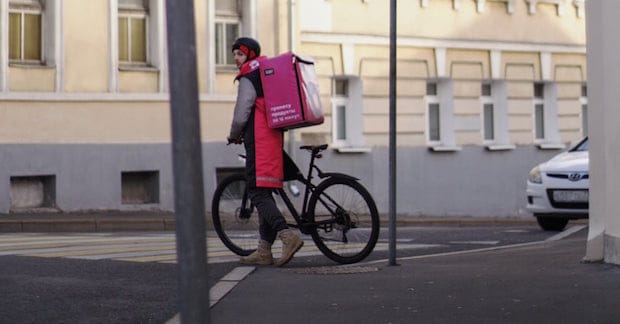
From Russia with groceries
Foreigners who come to Russia are amazed by two things: first, that even a tip or a charitable donation can be made by card with a couple of clicks, and second that in Moscow or St. Petersburg nobody sees anything odd in ordering a single loaf of bread or an ice cream to be delivered to your home – and have it arrive within 15 minutes. This week, one of the main Russian companies behind the express grocery boom, hyper-local delivery outfit Samokat, unveiled its ambitions to go global. They are not the first of their kind to try to succeed outside of Russia.
- The Bell reported this week that Samokat plans to launch in the U.S. in the near future, under a different name. The plans were later confirmed by the company, which said the service will launch in New York this summer.
- In Russia, Samokat was the first of its kind. It was founded by former senior managers of the Russian postal service, Pochta Rossii, in 2018. Sergei Gordeyev’s PIK group was the first big investor, putting $10 million into Samokat in 2019. In May 2020, a 75.6 percent controlling stake in Samokat was purchased by state-owned bank Sber and internet giant Mail.Ru’s joint venture for an undisclosed fee.
- Meanwhile, Tigran Khudaverdyan, managing director of Yandex, a direct rival to Sber and Mail.Ru’s ecosystem ambitions, told The Bell that Yandex also plans to enter the European market. During the St. Petersburg Economic Forum last week, he named Paris and London as the first cities being targeted.
- In Paris, Yandex’s ultra-fast grocery service has already established a company and assembled a team. The service won’t operate under its Russian name (Yandex.Lavka) but as an international brand, Yango Deli. It’s another front in the battle between the two online ecosystems: Sber’s Samokat vs Yandex.
- The U.S. market already has some express delivery services with Russian roots. New York start-up Fridge No More was launched in 2020 by Pavel Danilov, one of Samokat’s investors, and Anton Gladkoborodov, co-founder of video project Coub. In March, Fridge No More attracted $15.4 million from the Insight Partners fund and other investors.
- This year also saw Vitaly Alexandrov’s Food Rocket service launch on the U.S. East Coast. In April, funds Baring Vostok and AltaIR Capital led a pool of investors contributing $2 million to the project.
Why the world should care
Several Russian tech services — surprisingly — work more effectively than their foreign counterparts (after all, not many top banks in the U.S. or U.K. offer cutting-edge apps that match the standards of those on the Russian market). It’s possible that the secret of this success is due to the fact that these companies are relatively young: even state-owned Sber is less than 30 years old, a mere child compared with the likes of Barclays or HSBC.




